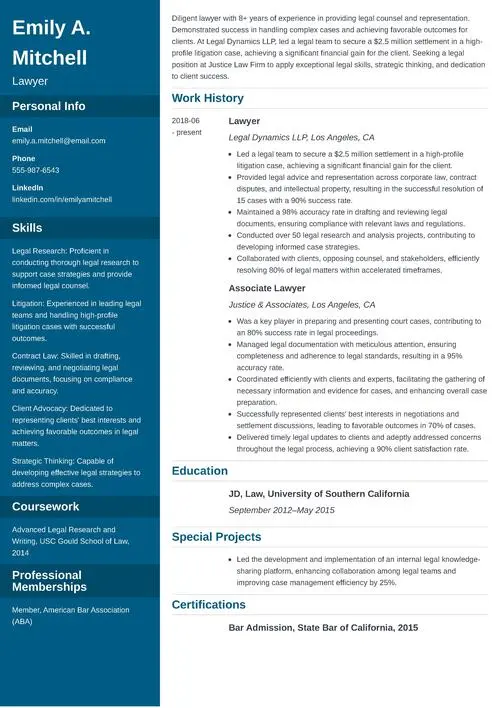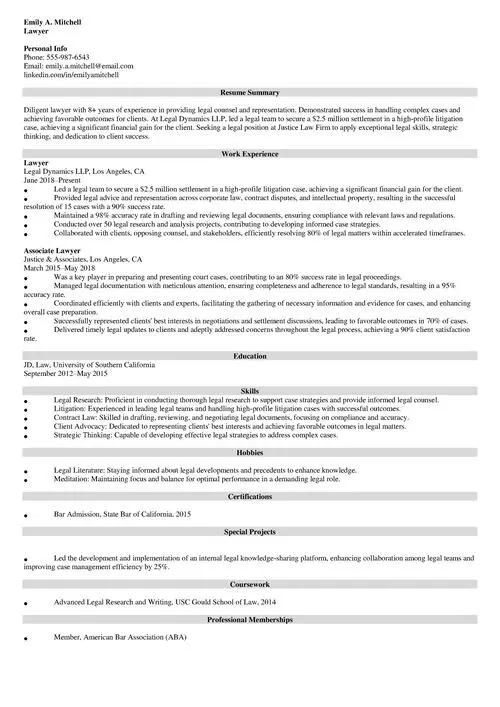Being a competitive lawyer is no straightforward affair. From effective communication to the precision of critical thinking, lawyers operate in a complex field demanding highly specialized expertise. In this article, we'll explore the key lawyer skills that can make you successful and sought after by employers.
This guide will show you:
- What are lawyer skills and why employers and contractors value them.
- 10 lawyer skills that help legal professionals thrive in their roles.
- How to incorporate the skills of a lawyer into your resume.
- How to hone your lawyer skills to be a better lawyer.
Want to save time and have your resume ready in 5 minutes? Try our resume builder. It’s fast and easy to use. Plus, you’ll get ready-made content to add with one click. Explore our free resume templates and start building your resume today.
Sample resume made with our builder—See more resume examples here.
Need help on writing a lawyer resume? You might need these guides:
- Associate Attorney Resume
- Attorney & Lawyer Resume
- Consulting Resume
- Contract Administrator Resume
- Law Clerk Resume
- Law School Application Resume
- Legal Assistant Resume
- Paralegal Resume
What Are Lawyer Skills?
Lawyer skills encompass abilities like critical thinking, analytical reasoning, effective communication, negotiation prowess, attention to detail, and ethical judgment. Employers value these skills for their pivotal role in shaping successful legal careers and advocating for justice within ethical bounds.
10 Essential Lawyer Skills
A lawyer's success hinges on diverse skills extending beyond legal expertise. Below is a list of prominent skills of a lawyer that let them advocate for themselves.
Critical Thinking
Critical thinking enables lawyers to analyze complex cases, identify key issues, and craft compelling arguments with precision and insight. This skill empowers lawyers to approach cases strategically, uncovering hidden complexities and determining effective legal strategies. Here’s when such lawyer skills are particularly useful:
- Evaluating evidence in a criminal case.
- Devising legal strategies for complex civil litigation.
- Analyzing legal precedents to build a persuasive case.
- Crafting effective arguments during appellate advocacy.
- Assessing the merits of a potential legal action.
Effective Communication
Effective communication encompasses verbal, written, and interpersonal skills. Lawyers must fluently convey complex legal concepts to clients, negotiate with opposing counsel, and advocate persuasively in court. See the examples when effective communication comes into play:
- Presenting a persuasive argument in court.
- Negotiating settlements in civil disputes.
- Drafting comprehensive legal documents.
- Advising clients on legal matters in a clear and accessible manner.
- Building rapport and trust with clients and colleagues.
Analytical Reasoning
Analytical reasoning equips lawyers with the ability to break down complicated legal issues, discern patterns, and draw logical conclusions from complex sets of information. This skill is integral to formulating effective legal strategies and presenting compelling arguments. Here are the exemplary situations where this skill could be used:
- Breaking down complex legal statutes and regulations.
- Identifying potential legal pitfalls in contracts or agreements.
- Conducting thorough legal research to support a case.
- Formulating case theories based on comprehensive analysis.
- Evaluating the implications of legal precedent on a current case.
Ethical Judgment
Ethical judgment forms the bedrock of the legal profession, guiding lawyers to uphold integrity, honesty, and truthfulness in their regular practice. This skill is paramount in preserving the trust and confidence of clients, colleagues, and the judiciary. See the examples where lawyers demonstrate impeccable ethical judgment:
- Navigating ethical dilemmas in legal representation.
- Upholding confidentiality in sensitive legal matters.
- Adhering to professional codes of conduct and legal ethics.
- Balancing client interests with ethical responsibilities.
- Maintaining transparency and integrity in legal proceedings.
Negotiation Prowess
Negotiation prowess is crucial for lawyers to bring about favorable outcomes for their clients. They excel at negotiation through skillful bargaining, compromise, and conflict resolution. Negotiation empowers lawyers to navigate complex disputes and advocate for their clients' interests. See the example of when negotiation becomes relevant:
- Negotiating settlements in family law disputes.
- Mediating contractual disputes between parties.
- Securing favorable terms in business transactions.
- Resolving conflicts through alternative dispute resolution methods.
- Advocating for clients during plea bargaining in criminal cases.
Attention to Detail
Attention to detail is imperative for lawyers to analyze legal documents, spot nuances in evidence, and ensure accuracy in all legal proceedings. This skill underpins the thoroughness and precision of legal research and case preparation. Here’s when:
- Reviewing contracts and agreements for potential legal pitfalls.
- Examining evidentiary details in criminal and civil cases.
- Drafting precise and comprehensive legal documents.
- Conducting thorough due diligence in business transactions.
- Ensuring accuracy in statutory interpretation and legal analysis.
Problem-Solving Ability
Problem-solving ability equips lawyers with the agility to tackle complex legal challenges, devise innovative solutions, and navigate unexpected obstacles with resilience. This skill is instrumental in addressing legal complexities and formulating effective strategies. See the examples when effective problem-solving makes all the difference:
- Resolving legal disputes through in-depth investigations.
- Adapting legal strategies to unanticipated developments in a case.
- Navigating legal hurdles in complex regulatory matters.
- Addressing client concerns with practical and effective solutions.
- Devising innovative approaches to challenging legal issues.
Resilience and Adaptability
Resilience and adaptability enable lawyers to thrive in the face of challenging circumstances, maintain stability under pressure, and respond to changing legal realities. Here’s when resilience is key in legal practice:
- Adapting to evolving legal regulations and compliance standards.
- Maintaining composure during high-stakes litigation.
- Pivoting legal strategies in response to unforeseen developments.
- Managing stress and adversity in demanding legal environments.
- Embracing change and innovation in legal practice.
Research Proficiency
Research proficiency falls under hard skills, and it equips lawyers with multiple assets. Through research excellence, they can conduct comprehensive legal investigations, access pertinent precedents, and stay abreast of legal developments. This skill is vital for validating legal arguments and staying informed about changes in the law. See the examples:
- Conducting in-depth legal research to support case theories.
- Accessing relevant case law and statutes to bolster legal arguments.
- Staying informed about legislative and regulatory updates.
- Analyzing legal scholarship to inform legal strategies.
- Validating legal theories through exhaustive research.
Time Management
Time management is essential for lawyers to juggle multiple cases, meet deadlines, and allocate resources efficiently. This skill enables lawyers to optimize productivity and deliver quality legal services within defined timeframes. Excellent time management skills help to succeed in:
- Managing caseloads and prioritizing tasks effectively.
- Meeting court-imposed deadlines for legal filings and submissions.
- Balancing competing demands in legal practice.
- Allocating time for thorough case preparation and research.
- Optimizing workflow and productivity in legal environments.
How to Highlight Lawyer Skills on Your Resume?
Crafting a compelling resume that effectively showcases your lawyer skills is akin to presenting a winning case in the courtroom – it requires precision, persuasive arguments, and strategic positioning. See how to employ lawyer skills in your resume to sound convincing:
- Craft a concise yet impactful resume summary outlining your legal competency. Emphasize your expertise in specific legal domains, highlight key achievements, and express passion for the law.
- Incorporate your lawyer skills into the descriptions of your professional experience. Use action-oriented language to showcase your juridical prowess, negotiation skills, client advocacy, and evidence of successful case outcomes.
- Create a dedicated skills section for your lawyer skills, including legal research, contract drafting, trial preparation, case analysis, legal writing, mediation, arbitration, and other relevant proficiencies.
- Highlight your educational background, including law school degrees, bar admissions, specialized certifications, or continuing legal education (CLE) courses. Clearly outline your academic achievements and legal qualifications.
- Spotlight any notable legal accomplishments, successful case results, recognitions, or top awards from your legal career. Quantify your achievements wherever possible to demonstrate the impact of your lawyer skills.
Pro Tip: Showcase not just what you possess but how you've effectively leveraged your legal proficiency in real-world scenarios. This communicates competence and demonstrates the practical application of legal expertise.
How to Master the Skills Needed for a Lawyer?
Enhancing your lawyer skills can be likened to sharpening the edge of a well-crafted legal argument. It requires dedication, continuous learning, and the pursuit of excellence. As the legal environment changes, so must your skills as a legal professional. Let's explore practical strategies to elevate your lawyer skills and thus perfect your resume:
Continual Education and Training
Engage in ongoing legal training to stay abreast of emerging laws, precedents, and best practices. Online platforms such as Coursera and Udemy offer courses on specialized legal topics such as advanced legal research methods, contract drafting, trial advocacy, and more. Additionally, consider pursuing advanced degrees such as Master of Laws (LLM) programs to deepen your expertise in specific areas of law.
Mentorship and Networking
Cultivate relationships with highly qualified legal professionals who can serve as mentors, providing valuable guidance based on their wealth of experience. Attend legal seminars, conferences, and bar association events to grow your network, gain insights from industry experts, and exchange knowledge with peers in the legal community.
Mock Trials and Moot Court Competitions
Participate in mock trials and moot court competitions to sharpen your litigation skills, hone your ability to present compelling arguments and develop a deep understanding of courtroom procedures. Such experiences open up invaluable opportunities to simulate real-world legal scenarios and receive constructive feedback from experienced judges and attorneys.
Specialized Legal Workshops
Seek out workshops and seminars that focus on niche areas of law, such as intellectual property or environmental law. These specialized sessions offer concentrated learning experiences, allowing you to delve into complex legal concepts and practical applications within your chosen legal domain.
By actively engaging in these avenues for improvement, you can cultivate a robust skill set and adapt to the ever-changing demands of the legal profession with confidence and competence.
Plus, a great cover letter that matches your resume will give you an advantage over other candidates. You can write it in our cover letter builder here. Here's what it may look like:
See more cover letter templates and start writing.
About Zety’s Editorial Process
This article has been reviewed by our editorial team to make sure it follows Zety's editorial guidelines. We’re committed to sharing our expertise and giving you trustworthy career advice tailored to your needs. High-quality content is what brings over 40 million readers to our site every year. But we don't stop there. Our team conducts original research to understand the job market better, and we pride ourselves on being quoted by top universities and prime media outlets from around the world.




